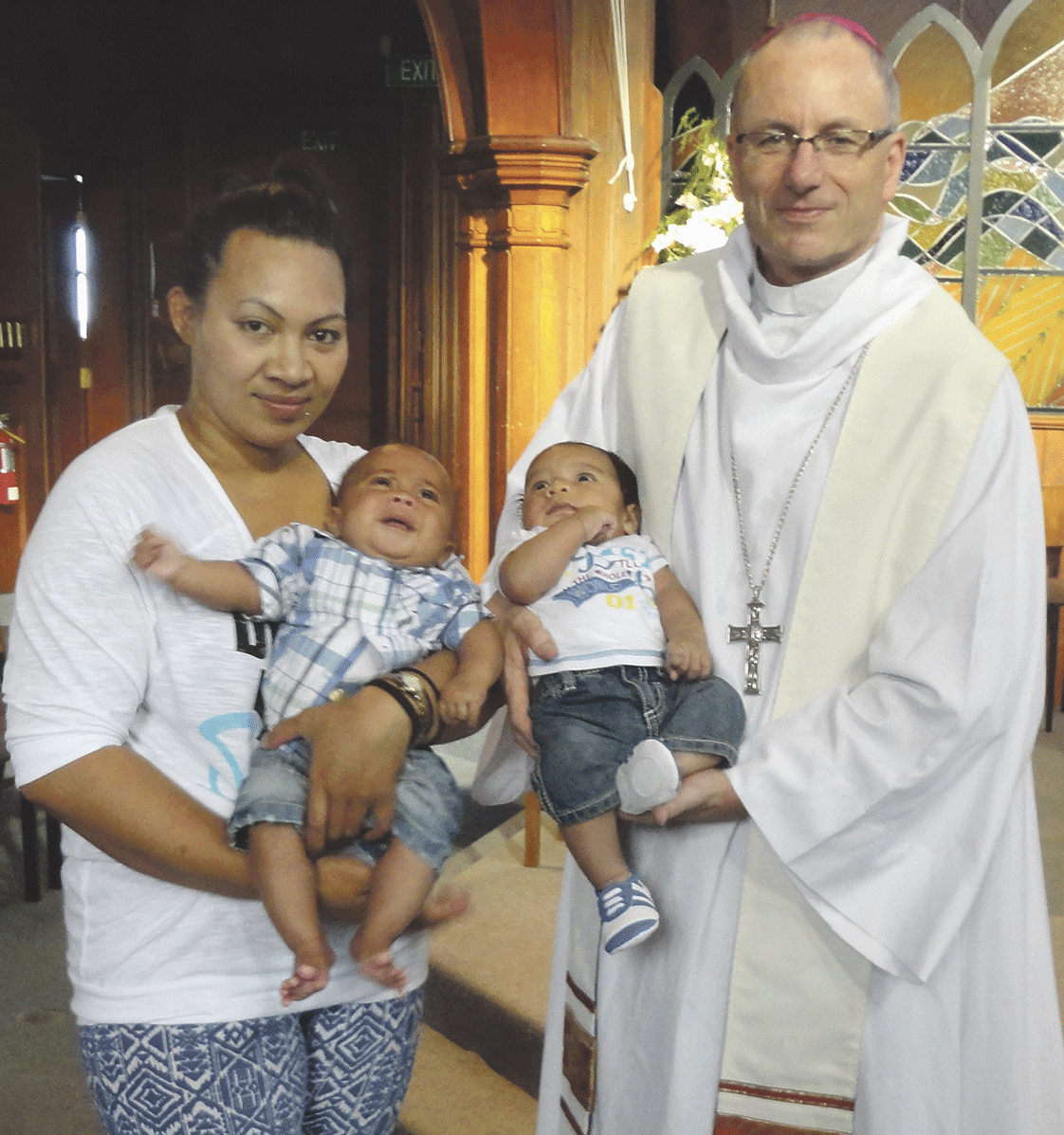 March 2015
March 2015
Feature
‘If we pray, if we hope, if we expect, if we work and if we shepherd for growth it will come. And by growth I mean a deepening of our faith and also, today, I want to say let’s grow in numbers too.’ Arena Mass, Palmerston North, 2013
Following a planning session in February with his Palmerston North Diocesan staff, Wel-Com interviewed Bishop Charles Drennan about the Diocese and ideas for the coming year.
What is the main role of the Diocese office?
The Diocesan Office exists to support the mission of the Church and in particular the Bishop’s role as Shepherd of the Diocese. Therefore, the fundamental purpose of every staff member’s position is to enhance the growth of the faith communities or iwi whakapono we all serve and for which we all have a responsibility.
To meet these goals, staff work within and across teams with a spirit of collaboration and a readiness to evangelise creatively. Siloed, insular thinking has no place in this mission.
We endeavour to work in a spirit of co-responsibility. This is not a new pastoral term. St Paul, for example, described Priscilla and her husband Aquila, whom he met in Corinth, as ‘fellow workers in Christ Jesus’ (Romans 16:3). Together they established the Church in Ephesus.
Contemporary shepherding requires agility, tracking our people in a good sense. Do we know people by name? Do we notice when people drift away? How effectively do we accompany people through transition points – from Catholic primary to state high, from school to uni or polytech, between parishes etc? We do that well when we love the whole Church.
When talking about faith how is growth measured?
That’s a tricky question. The answer lies with the Holy Spirit. But certainly we have to feel accountable to something bigger than our own ideas and plans, and have goals that drive and unite us. We rightly deserve to feel satisfied when we see the awakening or growth of faith in others.
So our individual or team initiatives are a subset of something bigger: the wider mission of the Church. When we evaluate, it is the bigger vision that we must keep in mind not just bureaucratic tick-boxes.
Pope Francis’ document The Joy of the Gospel ‒ Evangelii Gaudium, is a great help. ‘It’s a call for conversion, imagination, renewal, risk, mission’ (all his words).
‘Mere administration can no longer be enough. We need pastoral conversion; let us be permanently in a state of mission’ (25).
‘I dream of a missionary impulse transforming everything in the Church so that our ways of doing things, times and schedules, language and structures can be channelled for evangelisation rather than the self-preservation that can consume us….’ (27).
‘The principal aim of participatory processes should not be organisation but aspiration, the aspiration of reaching everyone’ (31).
What does this call to action mean for the Diocese?
We are embarking on a direction that will see unification of parishes in our provincial cities. Wanganui, New Plymouth, Napier and Hastings each currently have three parishes. Soon each city will have one unified faith community.
Growing our parishes certainly requires efficient administrative support of our priests, but what is needed even more is the doing of pastoral and evangelising work by laity – paid and voluntary – out of the office, away from computer screens, in homes, in the community, on the margins. We must resist secular models of planning that are bureaucratic and office-bound.
Can you tell us about some of the positive developments in the Diocese?
There is a great atmosphere in the Diocese. I experience enthusiasm and joy on school and parish visits.
Last year the number of Baptisms increased greatly. That was partially because we – myself, priests, DRSs and others – found a language with which to explain the wonders of this sacrament to our people. Our Young Catholic Leadership and Life Teen camps are strong and growing. We have been blessed with four recent ordinations to the diaconate, three of which, God willing, will see new priests. Enrolments in The Catholic Institute courses are increasing through better promotion. We have many great teachers and the parish unification process has brought to the fore very competent and generous leaders. And our Māori apostolate has been strengthened by the ordination of Deacon Danny Karatea-Goddard.
Each area of ‘success’ brings hope to everyone. Our elderly delight in the presence of the young.
What are some of the challenges you see ahead?
As Shepherd I need to say that it’s time to explore again the commitment to Sunday Mass, to keeping the Sabbath holy. Habit is good; it shapes us and protects us and demonstrates our priorities in life. The question is what time are we going to Mass on Sunday; not, are we going to Mass. This is not about rules. It is about being the person God wants me to be. That’s a big picture call, which I hope will echo in the heart and mind of everyone.
On a more specific level, faith formation of young people who are not in Catholic schools is still the Cinderella in our mission. Consistency of Chaplaincy service to our Colleges is another area of concern. Colleges that can afford a Chaplain get one, others don’t.
From baptism to participation is another area of focus that involves everyone. And parish music, engagement with the media, a more visible commitment to social justice, all point to the breadth of what we can always seek to address more actively.
I’m an optimist. How could we be otherwise? It’s the Lord’s mission: ‘I am with you always; yes, to the end of time’ (Mt: 28:20).